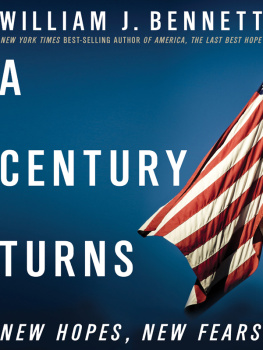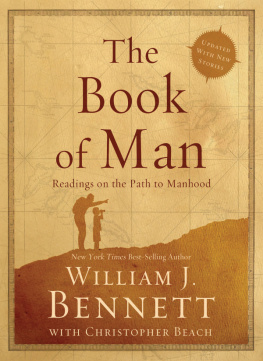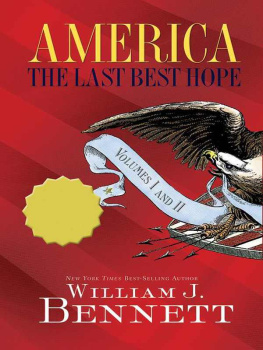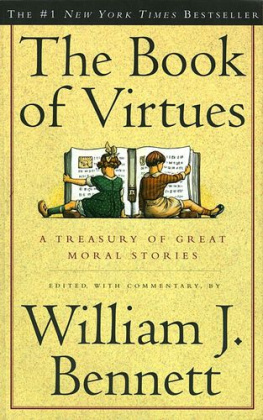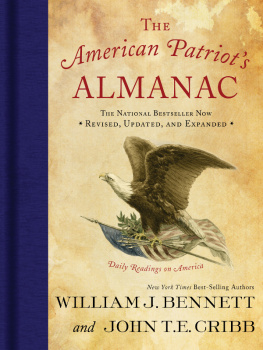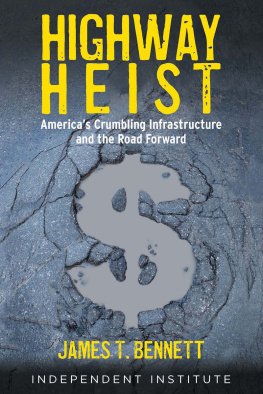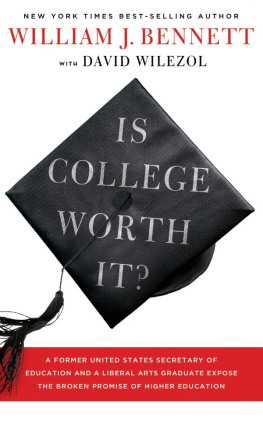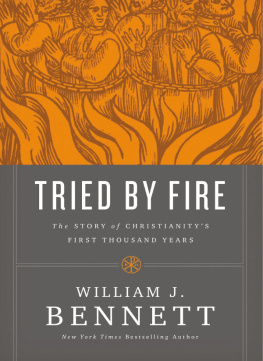A CENTURY TURNS
A CENTURY TURNS
New Hopes, New Fears
William J. Bennett

2009 by William J. Bennett
All rights reserved. No portion of this book may be reproduced, stored in a retrieval system, or transmitted in any form or by any meanselectronic, mechanical, photocopy, recording, scanning, or otherexcept for brief quotations in critical reviews or articles, without the prior written permission of the publisher.
Published in Nashville, Tennessee, by Thomas Nelson. Thomas Nelson is a registered trademark of Thomas Nelson, Inc.
Thomas Nelson, Inc., titles may be purchased in bulk for educational, business, fundraising, or sales promotional use. For information, please e-mail SpecialMarkets@ ThomasNelson.com.
Library of Congress Cataloging-in-Publication Data
Bennett, William J. (William John), 1943
A century turns : new hopes, new fears / William J. Bennett.
p. cm.
Includes bibliographical references and index.
ISBN 978-1-59555-169-6
1. United StatesPolitics and government1989 2. United StatesSocial conditions1980 3. Political cultureUnited StatesHistory. 4. Social change United StatesHistory. 5. United StatesForeign relations1989 I. Title.
E881.B46 2009
973.92dc22
2009042916
Printed in the United States of America
10 11 12 13 14 WC 5 4 3 2 1
To all the men and womenin uniform andoutwho sacrifice to keep us safe, as embodiedin the life and heroism of Rick Rescorla.
Contents
Chapter 5: In War and Culture:
A Clash of Values, A New Media, A New Election
I was not going to write this bookat least not right now. I concluded America: The Last Best Hope, volume II, with 1989, the last full year of the presidency of Ronald Wilson Reagan. In the epilogue, among other things, I wrote the following:
I cannot find the right words yet to dispassionately describe the relevant history of what we have gone through since his [Ronald Reagans] presidency ended. This is not because of my partisan or ideological convictions. Rather, it is because I believe more time needs to pass for us to fully and completely digest the history of the past two decades. Many of the players and actors of the past twenty years are still alive, and I wish to be fair to the times and root out any possible prejudice occasioned by my own association with the actors in this drama.
This was my position in 2006. But supply, as economists like to say, provides its own demand; just as demand can create its own supply. And since volume IIs publication, a particular demand has arisen that I never expected: teachers across the country have taken volumes I and II and turned them into a vast American history curriculum, both in print and online (see RoadmapToLastBestHope.com), and several state and city school districts have put the books and supplemental materials on their official adoption lists for the classrooms in their states and cities. Student and teacher editions have been created, and I have received many letters, telephone calls, and e-mails asking for a third volume, a volume that brings us up to date over the past twenty years. History courses ought to be able to take us as close to the present as possible.
While I raised all my objections to a third volume, my correspondents and callers remained persistent and unconvinced. I kept an open mind, and noticing the demand from students and teachers alike, I changed it. John Maynard Keynes famously said, When the facts change, I change my mind, and so, upon reflection, did I.
In thinking about volume IIIthe last twenty yearsI realized how long such a span can, in fact, be. Take some examples: twenty years before Ronald Reagan was nominated as the Republican candidate for president of the United States in 1980, he was still a Democrat. Twenty years after Ronald Reagan was elected president in 1980, his vice presidents son was elected president of the United States.
Almost twenty years after his resignation from the presidency in 1974, Richard M. Nixon was eulogized by President Bill Clinton, who, in 1974, was a law professor at the University of Arkansas running for a seat in Congress. At the same time, Bill Clintons girlfriend, Hillary Rodham, had just finished service on the House Judiciary Committee staff investigating the possible impeachment of Richard M. Nixon. And one year before that, Monica Lewinsky (whose affair with President Clinton would lead to his actual impeachment) was born. Twenty years before this writing, few people in America knew who Hillary Clinton was, and Bill Clinton was a governor from Arkansas whose only national reputationto the degree he had one at allwas for having delivered a long-winded speech at the 1988 Democratic National Convention. Margaret Thatcher was the prime minister of Great Britain twenty years ago; John McCain was serving his third year in the Senate; and Colin Powell had just been promoted to chairman of the Joint Chiefs of Staff.
Twenty years ago in our political and popular culture, there was no Fox News Channel; there was no Tonight Show with Jay Leno, no Daily Showwith Jon Stewart, no American Idol, no Jonas Brothers, no Taylor Swift, no Hannah Montana. Chris Matthews was a reporter for the San FranciscoChronicle. Sean Hannity was just beginning his career in local talk radio. Most of the country had not heard of Anchorage sportscaster Sarah Palin. And nobody but their families and friends had heard of Britney Spears, Jessica Simpson, Jennifer Lopez, Toby Keith, Tim McGraw, Justin Timberlake, Reese Witherspoon, Angelina Jolie, Jennifer Aniston, or Leonardo DiCaprio. The world did know of tyrants Saddam Hussein and the Ayatollah Ruholla Khomeini of Iraq and Iran, respectively. To the degree George W. Bush was known, it was as the fairly unnoticeable son of the then president and as the owner of a Texas baseball team.
Twenty years is a long time. Twenty years ago, if you had asked someone to e-mail me or said, check out my Web site (or blog), or began a phrase with www or asked if an article was available online or tried to tell someone what was on your iPod playlist, you would have received a blank stare. Amazon was known simply as a forest in South America, blackberry was a fruit, and google meant nothing.
Twenty years before this writing, a young man named Barack Obama a second-year law studentwas just elected the first black president of the Harvard Law Review.
A Note on the Sourcing
Finally, a note on the use of the first person and sources in this volume. I lived through almost all of the history written about hereand was involved in much of it, from the important to the ancillary. For this and other reasons, I relied less on other history books and documents and more on my own memories and contemporary notes than usual. In an effort to reveal conflicts of interest as well as to show the younger reader where some of my insights come from, a good number of personal anecdotes and self-reference is made: not for vainglory butintentionallyfor context.
It certainly wasnt a verb. The search engine and software development company apparently took its name from something only mathematicians would recognize, the word googol, a noun signifying the value of ten raised to the hundredth power.
One
Enemies Abroad, Challenges at Home
Two things about George H. W. Bush: he was the kindest boss I everhad. A man of great decency, concerned for others personal well-beingand family, he said yes to any meeting requested and returnedevery phone call I ever placed to him. His handwritten and typed
Next page
